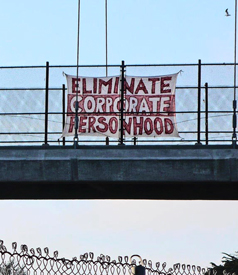In the wake of last week’s sweeping 5-4 Supreme Court ruling, which struck down several longstanding prohibitions on corporate political contributions, Democratic lawmakers are proposing legislation to counter some of its effects.
Perhaps the most politically promising proposal is the Fair Elections Now Act, a bill introduced which aims to blend small-donor fundraising with public funding as a means of reducing the pressure of fundraising from large contributors.
Proponents say the bill, introduced by Assistant Senate Majority Leader Dick Durbin (D-Illinois) and House Democratic Caucus Chairman John Larson (D-Connecticut), will make it easier for politicians to run campaigns without money from corporations and lobbyists, and also decrease time spent fundraising.
“The Supreme Court gave the deepest-pocketed special interests in Washington, D.C. even more power in Congress,” said Nick Nyhart, president and CEO of Public Campaign, a nonprofit organization dedicated to campaign reform. “The most comprehensive response to fight back against this immoral, activist decision is the Fair Elections Now Act.”
In his State of the Union address, President Barack Obama also took aim at the high court’s decision in the case, Citizens United v. Federal Election Commission, which he said “reversed a century of law that I believe will open the floodgates for special interests — including foreign corporations — to spend without limit in our elections.”
“I don’t think American elections should be bankrolled by America’s most powerful interests, or worse, by foreign entities,” Obama said. “They should be decided by the American people, and I’d urge Democrats and Republicans to pass a bill that helps correct some of these problems.”
Reacting to Obama’s comments, Justice Samuel Alito “shook his head and appeared to mouth the words, ‘not true.'”
To be eligible for public funding, candidates would have to raise small donations from a large number of citizens in the community in which they are running for office. For instance, in the current version of the bill, a candidate for the US House of Representatives would have to gather at least 1,500 donations and raise at least $50,000. The Fair Elections Now Act (S. 752 and H.R. 1826) currently has five co-sponsors in the Senate, including Arlen Specter (D-Pennsylvania) and Barbara Boxer (D-California), and 128 co-sponsors in the House.
Qualifying candidates would be given $900,000 – split 40/60 between the primary and the general election. In 2008, the median cost of the campaign by winning members in the House was $1.1 million, according to the Campaign Finance Institute, a nonpartisan campaign finance research organization.
Other legislative efforts would target corporations directly. Rep. John Hall (D-New York) has introduced a bill that would prevent corporations with more than five percent of foreign shareholders from airing political advertisements. The bill, he said, “will prevent foreign-influenced companies from buying U.S elections.”
Another proposal would attempt to change political contribution disclosure laws relating to publicly traded companies. Modeled on British campaign finance law, it would require companies to report any past political spending, as well as allow shareholders to vote on proposed future spending.
The House and Senate are scheduled to hold hearings on the effects of the ruling and possible legislative solutions next week.
We’re not backing down in the face of Trump’s threats.
As Donald Trump is inaugurated a second time, independent media organizations are faced with urgent mandates: Tell the truth more loudly than ever before. Do that work even as our standard modes of distribution (such as social media platforms) are being manipulated and curtailed by forces of fascist repression and ruthless capitalism. Do that work even as journalism and journalists face targeted attacks, including from the government itself. And do that work in community, never forgetting that we’re not shouting into a faceless void – we’re reaching out to real people amid a life-threatening political climate.
Our task is formidable, and it requires us to ground ourselves in our principles, remind ourselves of our utility, dig in and commit.
As a dizzying number of corporate news organizations – either through need or greed – rush to implement new ways to further monetize their content, and others acquiesce to Trump’s wishes, now is a time for movement media-makers to double down on community-first models.
At Truthout, we are reaffirming our commitments on this front: We won’t run ads or have a paywall because we believe that everyone should have access to information, and that access should exist without barriers and free of distractions from craven corporate interests. We recognize the implications for democracy when information-seekers click a link only to find the article trapped behind a paywall or buried on a page with dozens of invasive ads. The laws of capitalism dictate an unending increase in monetization, and much of the media simply follows those laws. Truthout and many of our peers are dedicating ourselves to following other paths – a commitment which feels vital in a moment when corporations are evermore overtly embedded in government.
Over 80 percent of Truthout‘s funding comes from small individual donations from our community of readers, and the remaining 20 percent comes from a handful of social justice-oriented foundations. Over a third of our total budget is supported by recurring monthly donors, many of whom give because they want to help us keep Truthout barrier-free for everyone.
You can help by giving today. Whether you can make a small monthly donation or a larger gift, Truthout only works with your support.
